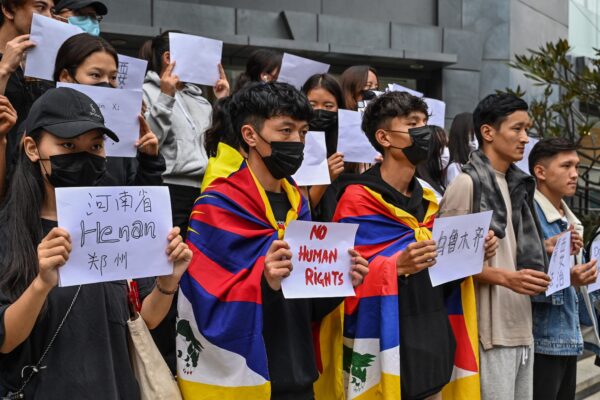China’s Gigantic ‘Stability Maintenance’ Budget Targets the Chinese People: Human Rights Lawyer
The Chinese communist regime recently released a public security budget for 2023 with official numbers of some 208.972 billion yuan ($30.5 billion)—the first time its projected public security expenditure has exceeded 200 billion yuan. Human rights lawyer Wu Shaoping said the so-called “stability maintenance” expenditures of the Chinese Communist Party (CCP) are effectively a bottomless pit for the dictatorship.
On the same day, March 5, Chinese premier Li Keqiang addressed the final governmental work report of his tenure, claiming that China spent over 70 percent of its fiscal expenditure on people’s livelihoods. Wu Shaoping said he suspects such monies are most likely spent on “operating the violent machinery” required to suppress the populace.
Strong Opposition to the Dictatorship
The Chinese Finance Ministry’s announcement of its estimated 208.972 billion yuan on public security signifies a 6.4 percent increase over 2022.
The Finance Ministry also reported projected expenditures for 2023 of 155.479 billion yuan ($22.7 billion) on education, up 2 percent, and 156.799 billion yuan ($22.9 billion) on general public services, down 0.7 percent.
Some commentators believe that the “White Paper Movement” and recent large-scale protests in Wuhan were the true reasons behind the elevated public security budget.
The exiled human rights lawyer, Wu Shaoping, agrees. He said, “The White Paper Revolution and the Wuhan elderly protest reflect people’s opposition to the CCP’s dictatorship.”

Huge Cost of Suppression
So-called “stability maintenance” covers expenditures on all aspects of so-called “public security,” such as costs for personnel from the state security apparatus and grassroots community staff, to facilities, to the installment and maintenance of equipment such as surveillance cameras, computer networks, and recognition systems.
“None of these operation funds are transparent,” Wu said. “[I believe that] the actual stability maintenance costs far exceed the official figures.”
In 2010, the CCP’s national domestic security spending exceeded its spending on external defense for the first time. What was a small margin in 2010 has continued to grow since then, according to the Jamestown report.
A 2018 analysis by researcher Adrian Zenz—Senior Fellow and Director of China Studies at the Victims of Communism Memorial Foundation in Washington—pointed to a 2017 mid-term budget report showing that local government spent nearly 10 billion yuan ($1.44 billion) in Xinjiang province alone on various stability maintenance-related items, including “centralized, closed-style education and training work.”
Wu Shaoping said that in China, everyone knows the expenditure on stability maintenance is virtually a bottomless pit, as well as that “the budget exceeds the national defense budget, and the actual expenditure goes beyond that of the national defense.”
It’s all for the purpose of sustaining the dictatorship, he said. “People see no end to it, and the entire society sees no end to it,” Wu continued, referring to the bottomless-pit analogy.
He gave the example of the color-coded QR code systems employed during the three years of the regime’s Zero-COVID policy. He said, “Is the development of this monitoring system funded from the stability maintenance funds? We don’t know. But when a person appears with a red code, he’s sent to the isolation center.” Wu said he believes the QR system is, in reality, part of the regime’s stability maintenance system.
Wu explained, “We don’t know which fund supported the development of this system, but, in terms of its entire operating mechanism, it must belong to the stability maintenance system.”
When Li Keqiang reported that the regime was spending 70 percent of national expenditure on people’s livelihoods, “it’s very much likely invested in stability maintenance,” Wu said.
The CCP’s Evil Nature
As researcher Zenz explained in another article, China’s domestic security budgets in Ministry of Finance reports typically only cite central government spending, and is only a fraction (about one fifth) of the national figure—which includes the central and regional level, including all provinces and autonomous regions.
Wu Shaoping called on the Chinese people to view the budget as a wake-up call. “The budget clearly demonstrates the bloody evil of the CCP; anyone with a clear mind and logic should see through it,” he said.
Zhao Fenghua and Li Yun contributed to this report.




